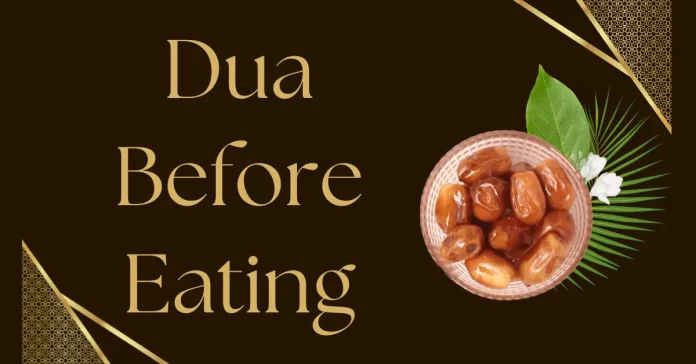Introduction
In the hustle and bustle of our daily lives, we often overlook the significance of the little moments that hold immense spiritual value. One such moment is the simple act of saying a prayer, known as “dua,” before we partake in a meal. This humble practice not only serves as a token of gratitude but also fosters a deeper connection between our physical sustenance and our spiritual well-being. Let’s explore the essence of dua before eating, its meaning, significance, and the profound impact it can have on our lives.
Understanding Dua Before Eating
Dua, or supplication, is a fundamental aspect of Islamic faith, encompassing prayers of gratitude, petition, and praise to Allah. The tradition of saying a dua before eating is rooted in the teachings of Prophet Muhammad (peace be upon him), who emphasized the importance of acknowledging the blessings bestowed upon us by the Creator. This simple act of remembrance instills mindfulness and gratitude in our hearts, transforming a mundane routine into a sacred ritual.
The Spiritual Significance
The act of consuming food goes beyond mere nourishment; it is a reminder of our dependency on Allah’s provision and mercy. By reciting a dua before eating, we acknowledge that our sustenance comes from Him alone and express our gratitude for His bountiful blessings. This spiritual connection elevates the act of eating from a mundane task to a profound act of worship, where every morsel becomes a means of drawing closer to our Creator.
Reference in Hadith
The practice of saying dua before eating is established in the traditions of Prophet Muhammad (peace be upon him). One such Hadith narrated by Umar ibn Abu Salamah states:
Narrated Umar ibn Abu Salamah: “I was a boy under the care of Allah’s Messenger (ﷺ) and my hand used to go around the dish while I was eating. So Allah’s Messenger (ﷺ) said to me, ‘O boy! Mention the Name of Allah, and eat with your right hand, and eat of the dish what is nearer to you.'” (Sahih al-Bukhari 5376)
Dua in Arabic:
بِسْمِ اللَّهِ
Transliteration:
Bismillah
Translation:
In the name of Allah.
Cultivating Gratitude
In the fast-paced modern world, it’s easy to take our meals for granted, overlooking the abundance and variety of food available to us. However, by pausing to say a dua before eating, we are reminded of the countless blessings that surround us. This simple act cultivates gratitude in our hearts, helping us develop a mindset of appreciation for the blessings, both big and small, that enrich our lives.
Fostering Mindful Eating
In today’s culture of fast food and constant distractions, mindful eating has become increasingly rare. However, saying a dua before eating serves as a gentle reminder to slow down and savor each bite mindfully. By centering our attention on the act of eating and expressing gratitude for the food before us, we become more conscious of our dietary choices and develop a deeper appreciation for the nourishment provided to us.
Strengthening Family Bonds
The practice of saying a dua before eating also serves as a beautiful way to strengthen family bonds and foster a sense of unity. Gathering around the table to recite a dua together encourages communication, reflection, and mutual appreciation. It creates a sacred space where family members can connect, share their experiences, and express gratitude for the blessings they have received.
Incorporating Dua into Daily Life
Integrating the practice of saying a dua before eating into our daily routine is a simple yet powerful way to infuse our lives with spirituality. Whether we’re dining alone or with loved ones, taking a moment to pause and acknowledge the source of our sustenance adds depth and meaning to our meals. By making dua a consistent part of our eating habits, we cultivate a sense of mindfulness and gratitude that permeates every aspect of our lives.
Listen to Dua before eating
Conclusion
In conclusion, the tradition of saying a dua before eating is more than just a ritual; it’s a profound expression of gratitude, mindfulness, and spiritual connection. By pausing to acknowledge the blessings bestowed upon us and expressing gratitude for the food before us, we elevate the act of eating to a sacred practice. Let us embrace this timeless tradition and imbue our meals with the richness of faith, one dua at a time.
Frequently Asked Questions (FAQs)
- What is dua before eating?
Dua before eating is a prayer, or supplication, recited before beginning a meal in Islam. It’s a way of expressing gratitude to Allah for the food provided and acknowledging His blessings. - Why is dua before eating important?
Dua before eating serves several purposes. It reminds us of our dependence on Allah for sustenance, fosters mindfulness and gratitude, and strengthens our spiritual connection with Him through a simple yet profound act of worship. - Is there a specific dua to recite before eating?
Yes, there are specific duas recommended by Prophet Muhammad (peace be upon him) to recite before and after eating. The most common dua before eating is: “Bismillah” (In the name of Allah). After completing the meal, it is recommended to say: “Alhamdulillah” (All praise is due to Allah). - Can dua before eating be recited in any language?
Yes, dua before eating can be recited in any language. While the Arabic phrases are traditional and hold spiritual significance, the essence of expressing gratitude to Allah can be conveyed in one’s native language as well. - Do I have to say dua before every meal?
While it’s encouraged to say dua before every meal as a practice of gratitude and mindfulness, it’s not obligatory. However, making dua before eating a regular habit can enrich the spiritual dimension of daily life and enhance one’s connection with Allah. - Can dua before eating be recited silently or does it need to be said aloud?
Dua before eating can be recited either silently or aloud, depending on personal preference. The sincerity of the supplication is what matters most, regardless of whether it’s said silently or audibly. - Is there a specific time or circumstance when dua before eating should be recited?
Dua before eating should ideally be recited just before beginning the meal. It can be said in any circumstance, whether dining alone, with family, or in a social setting. - Can non-Muslims say dua before eating?
Absolutely, expressing gratitude before a meal is a universal practice that transcends religious boundaries. While the specific wording of the dua may differ, the act of acknowledging blessings and giving thanks is a common thread across various faiths and cultures. - Does dua before eating have any health benefits?
While the primary purpose of dua before eating is spiritual, there are potential indirect health benefits. Cultivating mindfulness and gratitude through this practice can promote healthier eating habits and a more positive relationship with food. - How can I incorporate dua before eating into my daily routine?
Incorporating dua before eating into your daily routine can be as simple as remembering to pause for a moment of reflection and gratitude before each meal. Setting a reminder or making it a habit to recite the dua silently before picking up your utensils can help integrate this practice seamlessly into your day.

